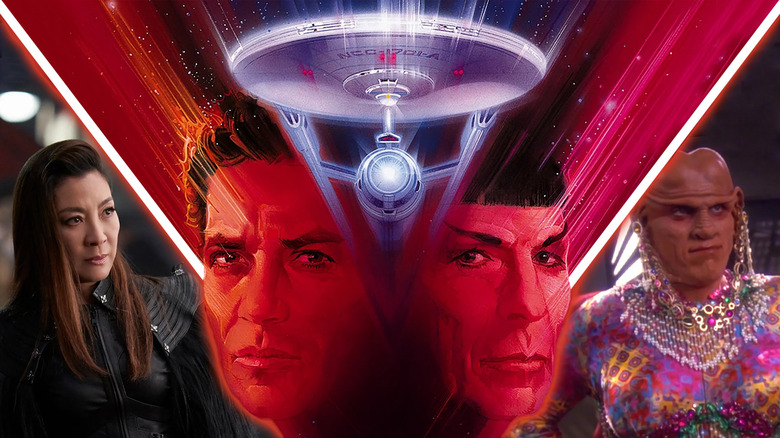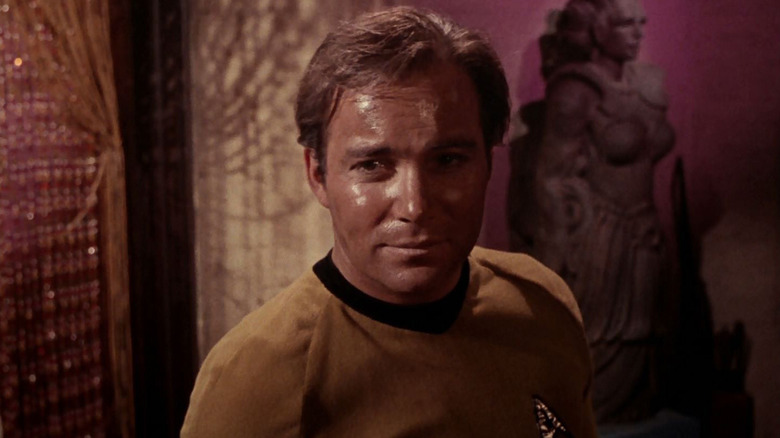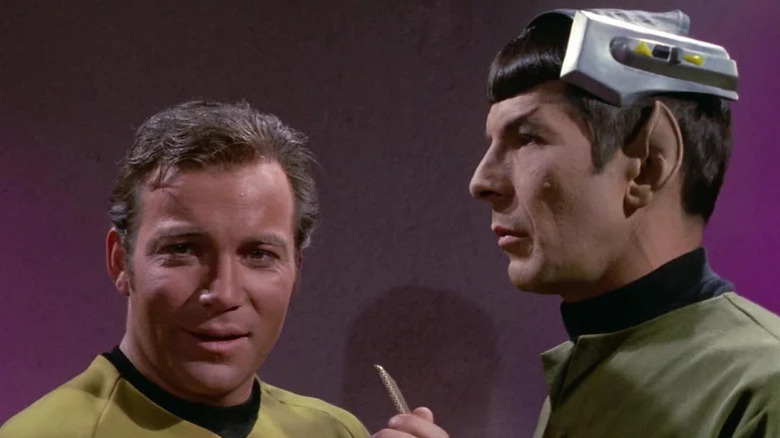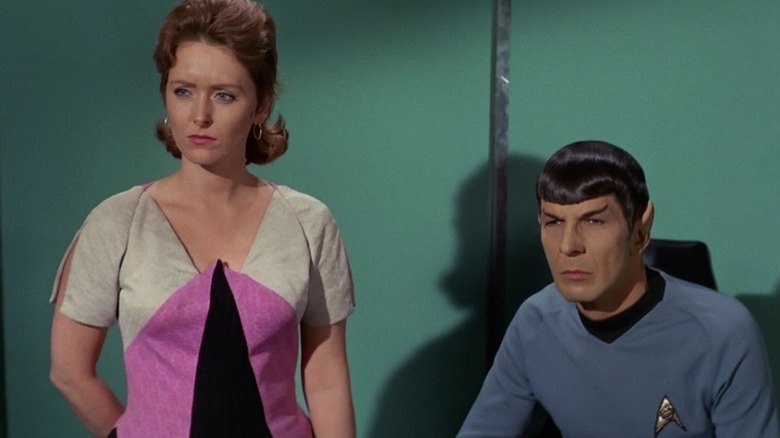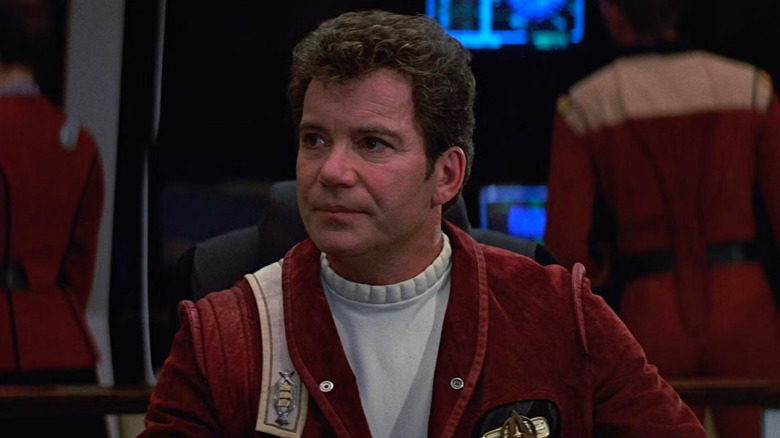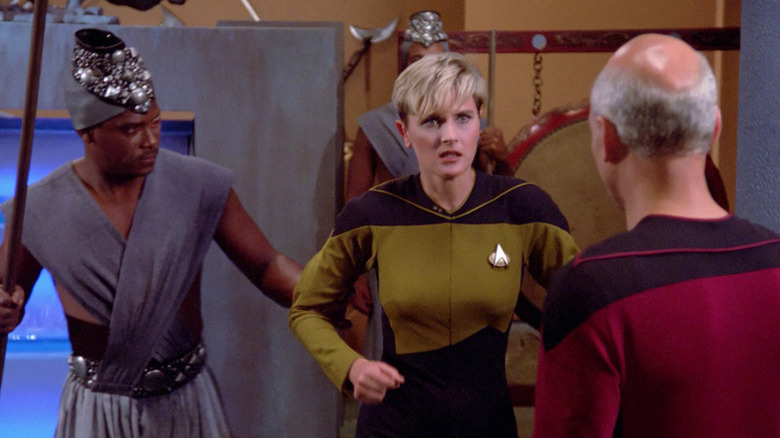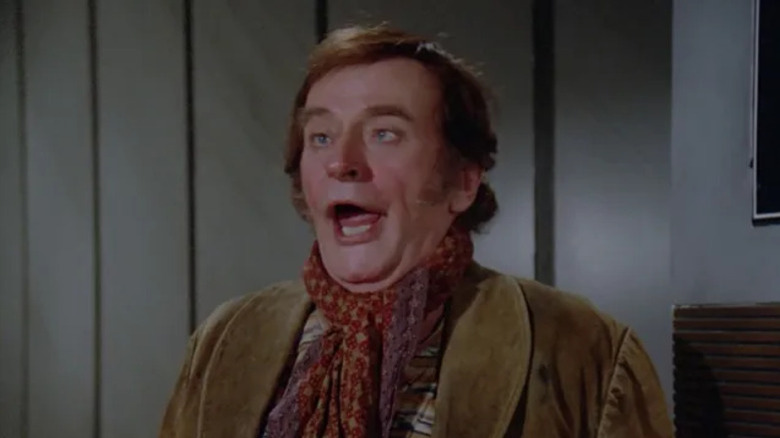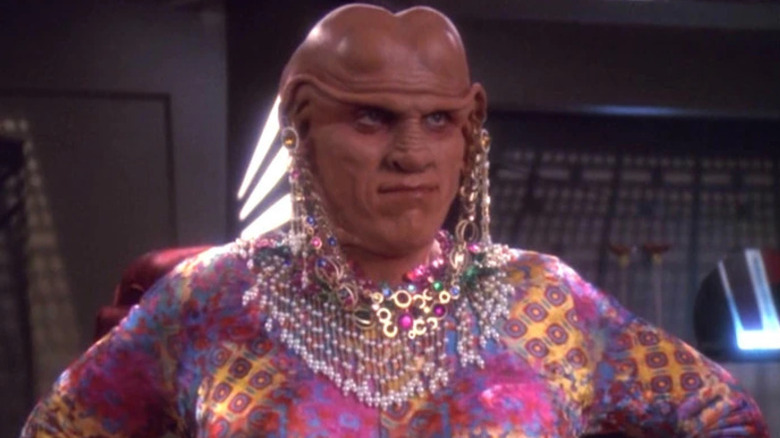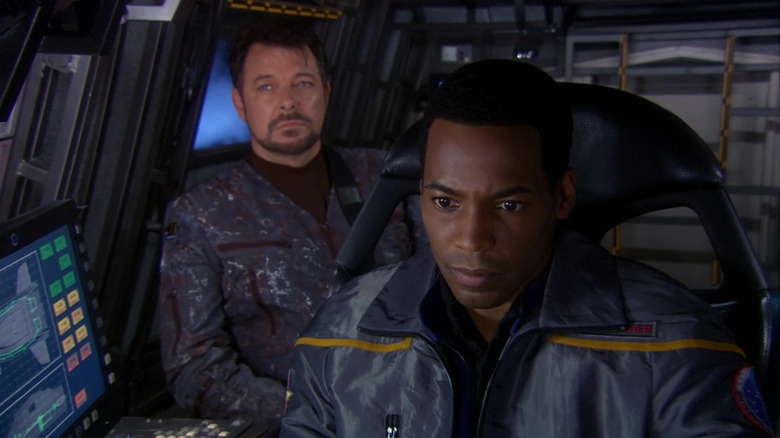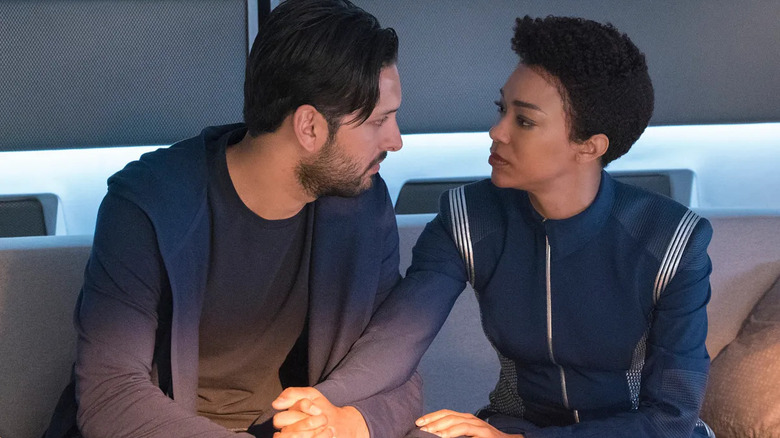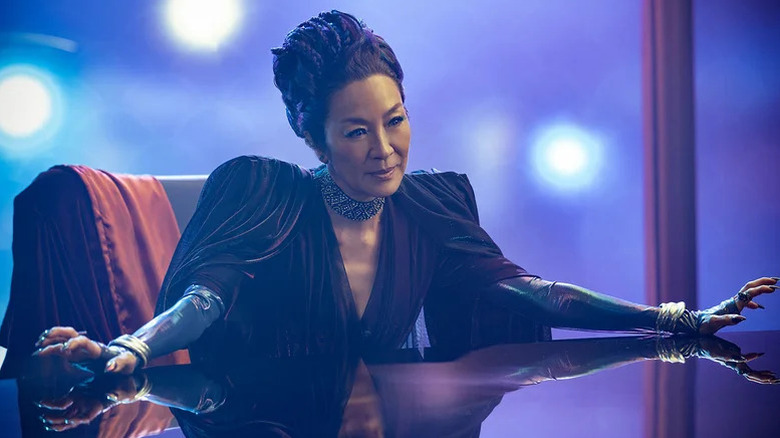10 Worst Star Trek Stories Of All Time
For generations, "Star Trek" has pioneered imaginative science fiction storytelling in both television and film, painting a more optimistically wondrous view of the future. Usually set centuries into the future, this vision of the universe has humanity living in harmony on Earth and exploring the cosmos. Faced with the unknown, the various characters throughout the franchise's history face challenges that test them while providing timely messages about the human condition. Simply put, "Star Trek" is life-changing and the greatest sci-fi franchise of all time, a distinction it's maintained for decades.
But, of course, nobody has a perfect record when it comes to storytelling, including and especially "Star Trek."
There are some stories throughout "Star Trek" that either need to be seen to be believed or avoided at all costs, depending on your threshold for ludicrous storytelling. These are stories that largely started with the best of intentions but completely collapsed in their execution because of a poor narrative premise to begin with. To keep things concise, we're focusing on lesser "Star Trek" movies and television episodes, rather than including novels, comic books, and video games too.
Here are the 10 worst "Star Trek" stories of all time when it comes to the franchise's work in film and television.
The Omega Glory (The Original Series)
Gene Roddenberry may have created "Star Trek," but he also wrote one of the worst episodes in "The Original Series" with the second season's "The Omega Glory." The Enterprise finds the planet Omega IV gripped in a bloody civil war between the Yangs and Kohms, escalated by the rogue Starfleet officer Ronald Tracey (Morgan Woodward). The landing party is shocked to discover that the Yangs are paralleling the birth of the American republic, right down to facsimiles of the American flag, Pledge of Allegiance, and Constitution. The Kohms, resembling Earth's Southeast Asian societies, are led by the increasingly mad Tracey, following a communist way of life.
"The Omega Glory" is about as subtle in its messaging as a brick to the face, with Yangs standing for the Yankees and Kohms standing for communists. The episode is also vaguely racist in its portrayal of the Kohms, something reinforced by them being led by a white savior figure in Tracey. At the end of the episode, Jim Kirk (William Shatner) defuses the situation by reciting the Pledge of Allegiance and quoting the Constitution, made more amusing by Shatner's Canadian background. An oddly jingoistic entry in the series, "The Omega Glory" plays out like a parody of itself, particularly in its rah-rah climax.
Spock's Brain (The Original Series)
Frequently ranked among the worst episodes of "Star Trek: The Original Series," the show's third and final season premiere was "Spock's Brain." The episode has a mysterious woman named Kara (Marj Dusay) teleport onto the Enterprise, incapacitate the crew, and steal the brain of Spock (Leonard Nimoy). Doctor McCoy (DeForest Kelley) is able to temporarily stabilize Spock and keep him mobile with an installed device as Kirk pursues Kara to a nearby planet. The landing party finds male and female civilizations strictly divided, with Spock's brain being used to power a supercomputer on the planet.
Compared to its first two seasons, the writing and production values in the final season of "TOS" are significantly worse. The cast and crew have spoken negatively about "Spock's Brain" specifically, with an embarrassed Leonard Nimoy reflecting that he was glad "Star Trek" got cancelled because of the diminishing quality. With Spock lumbering around the episode silently with a hilarious contraption on his head before instructing McCoy how to rewire his brain, it's easy to see why. "Star Trek" already appeared to be moving to an inevitable cancellation with its third season, and "Spock's Brain" underscored that the show's remaining time was limited.
Turnabout Intruder (The Original Series)
Just as "The Original Series" started its final seasons with one of its worst episodes, it similarly ended with one of its worst as well. The series finale, "Turnabout Intruder," had Kirk reunite with vengeful ex Janice Lester (Sandra Smith) who blames her status as a woman for lack of career progress. Using a strange device, Lester swaps bodies with Kirk and takes command of the Enterprise but quickly draws suspicion over her overly emotional behavior and erratic orders. As Kirk tries to convince the crew of what's happened, Lester desperately tries to maintain power, including threatening to have those who doubt her executed for mutiny.
With its handling of gender politics in the supposedly enlightened United Federation of Planets, "Turnabout Intruder" is one of those "Star Trek" stories that became unwatchable with age. Lester's career frustrations make her seem hysterical in what is the most misogynistic episode from the "TOS" era. This is made all the more apparent by Shatner's laughable overacting in portraying Lester while she's in control of Kirk's body. Arguably the worst "Star Trek" series finale to date, "Turnabout Intruder" ends "TOS" on a pathetic note given how forward-thinking and groundbreaking the show was.
Star Trek V: The Final Frontier
After the critical and commercial success of 1986's "Star Trek IV: The Voyage Home," the sci-fi property's movie prospects were riding high. This was reversed by its 1989 sequel "Star Trek V: The Final Frontier," which had such a troubled production that it almost killed the franchise. The movie introduces Spock's long-lost half-brother Sybok (Laurence Luckinbill), who seizes the Enterprise as part of his obsessive quest to find literal God. This naturally places him in conflict with Kirk and the crew, though he curiously investigates the matter with Sybok when they reach the deity's presumed location.
Though everything from budget cuts to studio mandated changes to the script hampered the production of "The Final Frontier," the biggest problem is the story itself. The idea of the Enterprise in search of the theological God is a misguided premise from the start, no matter how much the production got tinkered around it. Agreeing with this assessment was producer Harve Bennett, who squarely blamed William Shatner for the film's failure as Shatner had final story approval as the movie's director. Bennett had misgivings about the movie's core narrative direction from the start and, in this regard, he was exactly right.
Code of Honor (The Next Generation)
When "Star Trek" returned to television in 1987 with "The Next Generation," it did so with a stumble, as its inaugural season was easily the show's weakest. This is exemplified by the episode "Code of Honor," which had the Enterprise visit a planet with a culture resembling a caricature of Sub-Saharan Africa. The planet's leader, Lutan (Jessie Lawrence Ferguson), becomes enamored with the Enterprise's security chief Tasha Yar (Denise Crosby) and arranges her kidnapping. This culminates in Yar being forced to duel Lutan's mate in exchange for a valuable vaccine sought by the Enterprise.
"Code of Honor" has a premise and depiction of African cultures that's so backwards that '60s audiences would've considered it racist, much less those in 1987. The cast has vocally distanced themselves from the episode since its airing, with Michael Dorn worried about the show's future given its quality and content. Co-star Jonathan Frakes went one step further, wanting the racist episode removed from streaming platforms over how heinously tone-deaf it is. The nadir of all of "Star Trek: The Next Generation," "Code of Honor" really left a stain on the show's largely sterling legacy.
Up the Long Ladder (The Next Generation)
"TNG" continued to employ outdated cultural stereotypes into its second season with the episode "Up the Long Ladder." The Enterprise takes on a group of spacefaring refugees who resemble early 20th century Irish farmers, complete with hay and livestock. This coincides with the crew visiting a colony relying on cloning to stay populated, but with their genetic material source severely stagnated. In dealing with these two vastly different groups, the Enterprise finds a way to help both polemical ensembles form a viable community.
Since the show's conclusion, Patrick Stewart has publicly expressed his disappointment in the first two seasons of "TNG." Episodes like "Up the Long Ladder" provide solid evidence of why that perception is well-earned that feels laughable in all the wrong ways. The Irish stereotypes come off as more loud and cloying than funny, while the cloning storyline feels better served in a completely different context. Just as the episode revolves around two disparate communities joined together, "Up the Long Ladder" is two uninspired stories crammed together into a mess.
Profit and Lace (Deep Space Nine)
While "Deep Space Nine" has been reevaluated as one of the greatest "Star Trek" series of them all, it also doesn't boast a perfect track record. Case in point, the sixth season episode "Profit and Lace," which makes Quark (Armin Shimerman) an unlikely champion for women's equality among the Ferengi. At the urging of his mother Ishka (Cecily Adams), Quark disguises himself as a woman to convince the Ferengi commissioner to support a gender-progressive platform. This culminates in the disguised Quark trying to fend off the commissioner's unwanted romantic advances to ensure that the Ferengi install a forward-thinking Grand Nagus to lead them.
The Ferengi-centric episodes within "DS9" are already among the worst of the series, often featuring grating attempts at humor. "Profit and Lace" ups the ante by bringing in cross-dressing and transexual gags into the mix, all as unfunny as they are vaguely offensive. Shimerman did wonders in reforming fan reception of the Ferengi, making Quark one of the show's greatest characters in the process. But not even the fan-favorite actor can turn this dreadful story into something entertaining or remotely effective in its intended comedy.
These Are the Voyages... (Enterprise)
A prequel to the entire franchise, 2001's "Star Trek: Enterprise" detailed the early days of humanity as it explored the cosmos beyond the solar system. Though season 1's writing had major problems, the show's quality significantly improved as it found its own voice in later seasons. This evolution makes the creative decisions behind the series finale, "These Are the Voyages...," all the more baffling. The episode has Will Riker revisit the last mission of the Enterprise NX-01 with Captain Jonathan Archer (Scott Bakula) in an elaborate Holodeck program.
"These Are the Voyages..." essentially makes the "Enterprise" cast side characters to Riker in their own finale. This detached association is made more frustrating by the finale casually killing off fan-favorite character Trip Tucker (Connor Trinneer) in a forced way to make the story feel more impactful. Star Scott Bakula wasn't thrilled by the finale, with the episode considered by fans as a disservice to the show's cast and widely reviled. "Enterprise" deserved a more thoughtful way to go out on its own terms rather than its odd "TNG" framing device.
Into the Forest I Go (Discovery)
"Star Trek" began its resurgence for the streaming era with the 2017 series "Star Trek: Discovery," which started roughly 10 years before the events of "TOS." The opening season revolved around the United Federation's brutal war against the Klingon Empire from the perspective of Michael Burnham (Sonequa Martin-Green), a Starfleet officer on the USS Discovery. Joining Burnham is fellow officer Ash Tyler (Shazad Latif), who is discovered to be a Klingon altered by cosmetic surgery and mental programming to infiltrate Starfleet. In the episode "Into the Forest I Go," Tyler's painful past resurfaces, including being sexually abused by the Klingon warrior L'Rell (Mary Chieffo).
Tyler had a brutal enough backstory with the torturous procedures he endured to disguise himself as a human. To throw sexual assault on top of it felt like an exploitative overstep to instill an additional level of shock value. "Star Trek" is capable of telling rich and emotionally raw stories involving trauma, as evidenced by Picard's history with the Borg Collective. But "Into the Forest I Go" feels like a clumsy attempt to make the franchise more edgy or grim than it organically should be.
Section 31
After debuting in "Discovery," Philippa Georgiou (Michelle Yeoh) from the morally inverted Mirror Universe was intended to receive her own spin-off series. Plans shifted to Yeoh starring as Georgiou in a straight-to-streaming movie instead, with 2025's "Section 31" giving the character a mediocre send-off. The movie has Georgiou join Starfleet's black ops division, Section 31, to investigate the existence of an illicit superweapon. When Georgiou realizes that the weapon originates from the Mirror Universe, a familiar face from her past confronts her for the fate of the galaxy.
When it debuted, "Section 31" broke a horrible Rotten Tomatoes record for the franchise as its lowest-scoring movie, though its score has marginally improved since then. The movie just feels overstuffed, taking an entire proposed series plot and cramming it into a 95-minute experience. Everything about it feels rushed and uninspired, including the ensemble cast built around Georgiou, with Yeoh doing her best to keep things on track. With the questions it raises more based around plot holes than intriguing story points to follow, "Section 31" is as forgettable as the franchise's movies get.
